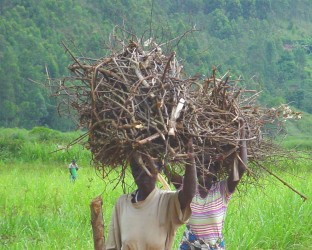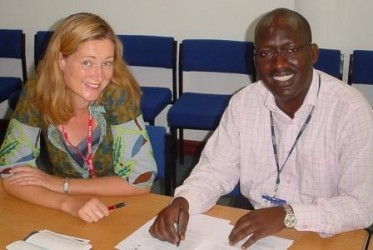Have you heard that water flows one way down the drain in the southern hemisphere and the other way in the northern hemisphere? Is it true? I live 1 degree south of the equator, and when I experimented pouring water in my washbashin, the water flowed anticlockwise. Does it flow clockwise in the northern hemisphere? Why not try it for yourself, and then look it up on the web and try and work out what is true?
Living south of the Equator has some definite advantages: one is that I get to see the Southern Cross star pattern at night time: it is a great constellation telling you exactly where south is. But what is interesting is that I can actually see the Southern Cross from here in the centre of Kigali. In much of the UK, where I come from, it is hard to see the stars because of light pollution, but that’s not the problem here. Only 6% of households have power in their homes, and most of these are in the major towns, so rural people rely on firewood, charcoal and kerosene as their main fuel.

Yesterday I met these two women from the village of Rwesero about 35 km north of Kigali; they were virtually buried under their loads of wood which they had gathered for cooking. The head-load will last for a few days to cook a pot of beans and potatoes and heat water for tea. But it is hard work collecting the sticks and a long way to walk. There is electricity in Rwesero, but only a very few houses have connections, and they will only use it for lighting as electricity is much too expensive to cook with.
Most of Rwanda’s power is currently produced by big diesel generators, but this is very costly and relies on being able to truck up fuel from the East African coast, a thousand miles away. Recent news is that the methane under Lake Kivu is starting to be used to produce electricity, and there are plans to hugely increase the hydro electric plants on the Rusizi River between Rwanda, the Congo and Burundi.
Hydro power is a terrific clean energy source with virtually no carbon impacts, but the big risk with climate change is that rainfall will be reduced and there won’t be sufficient water in the rivers to generate power.

And this is where Liberal Seburikoko and Maresa Oosterman come in. Liberal and Maresa are DFID Rwanda’s climate change leaders. They have been helping the Government of Rwanda organise a meeting in Kigali this week for African Finance Ministers to learn about the effects of climate change and the financial opportunities available for adaptation or mitigation. So this conference, and the lead-up to the world Climate Change convention in Copenhagen, are really crucial for Rwanda and other small nations.
While I love seeing the Southern Cross from my balcony, if losing that sight means that the women from Rwesero have got power, it is a loss well worth taking.

5 comments
Comment by Nick Fraser posted on
Very interesting post Martin.
I hope that the donors and technical experts assisting Rwanda with its electricity grid will be promoting energy-efficient street lighting. As I'm sure you know a lot of the street lighting employed in the developed world is grossly inefficient, losing a large percentage of light upwards to the sky. If Rwanda gets to install the best available lighting technology, I hope the women you visited in Rwesero will have their light and yet still be able to see the Southern Cross.
Comment by Martin Leach posted on
Thanks for your comment, Nick. Although DFID is not directly involved in power projects, we are certainly interested in promoting energy efficient Low Carbon development, and Rwanda is shaping up to become an influential player amongst developing countries in this regard. It is already planning a strategic study on energy efficiency, to complement its plans for lower carbon electricity generation. The blog was making specific reference to indoor, rather than street, lighting and in this regard the Government has already taken the radical step of distributing 150,000 low energy light bulbs in 2008. Martin
Comment by ntezimana aloys posted on
I come from eastern province, precisely from Nyagatare district, gatunda sector, and this region is going to get power very soon and every people living beside roads have access to electricity. Yet, most of them are declaring that it is expensive and they wont be able to purchase it. on one hand it is true but on other hand it is because they don't understand why every Rwandan should supply one's possible effort to stop relying on firewood and kerosene as main fuel. most of them don't know carbon dioxide's dangers on climate and environment in general. what is more sorry, is that are not only older who have this problem of misunderstanding but including young people living that area. on account of this, I'd like to suggest donors to take into this fact and try to foster education, especially informal education among youth and mobilization to all. This can be done simply by youth clubs for environment and so forth but such clubs need to confer and be liaised with different donors to get trainings and enabled to disseminate their knowledge, it can exert a big change in population mentality.
Please include young people in all of your activities, because Sustainability does not only refer to maintaining environmental balance and renewal. Sustainability encapsulates three facets of life: the environment, society and the economy. We live our lives in the overlaps and intersections of these facets, and our actions and attitudes help shape them. Their changing shapes in turn affect the way we are able to live our lives. The negative effects of unsustainable behavior are not easily contained. As has been proven by the global crises in food, the economy and the environment, the concept of the global village has gone beyond being a useful analogy to being a hard reality, making clear the need to adopt a global sense of social responsibility. With these things in mind, as the energizers of today and the holders of tomorrow, it is imperative that youth embrace the challenge of sustainability in its fullness as they help pave the way forward through the 21st century and beyond. Youth action, inclusion, and their full participation are keys to developing today’s world for the generations of today and tomorrow and central to a sustainable existence.
Comment by Kevin Hartley posted on
I was interested to read about your visit to Rwesero. I lived there fro five years - 1966-1971, teaching at the Petit Seminaire. There was no village there in those days and the only electricity was from our diesel generators - when they worked!
I hope you are enjoying your time in Rwanda - a country that has made so much recovery from the genocide and so much progress.
Best wishes
Kevin (my Kinyarwanda name is MUsore)
Comment by Martin Leach posted on
Thanks for your comment, Kevin. I have now left DFID Rwanda, as my appointment was only for a fixed period, but I keep a close eye on developments in the country. You are right that development progress has been impressive. There is a real drive to get things done in Rwanda.
Martin